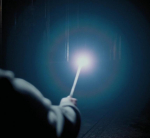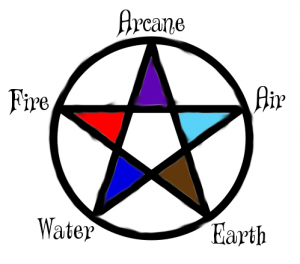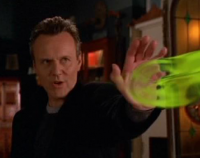About Magic
Magic Itself
“This magic that we have come to know is still a great mystery. We tap it for our own use, harness its power, but of its origin and its purest mechanics we still know little.” - from A Revised Study of Magic, Archmage Jeremiah Hodgkins, 1929.
The Five Schools
Magic has manifested itself in five forms accessible to wytches, relating to each of the five elements of air, earth, fire, water and the arcane1) which form the five schools of magical interest of Aeromancy, Geomancy, Hydromancy, Pyromancy, and Apocrymancy, a single one of which wytches find themselves naturally attuned to.
The methods of applying the magic of each school are common to each, although each takes a different flavour depending on its element. This manifests itself into five subschools (also called subskills or fields): Alteration, Enchantment, Evocation, Illusion and Protection, into which wytches specialise and devote their time.
- Alteration is the art of taking and manipulating the element of a school, moulding it into new forms and structures, for instance constructing a fortress from the ice or earth, or using the air to levitate things.
- Enchantment is the art of summoning a spirit of the element (from whence is still a topic of much research and debate) and either temporarily imbuing it into an object, bestowing it with the spirit's powers (for example, a sword of fire or boots of feather falling); storing it in something of the element in which it would live temporarily (for example, a golem); or placing it in a potion whereupon it passes on its powers to the potion (for example, making a potion of invisibility).
- Evocation is the art of using the element's power as offensive weaponry, such as fireballs or bolts of ice. Anything created by evocation is purely temporary, being a manifestation of magic, but the effects of which are most certainly not.
- Illusion is the art of manipulating the element to disguise or warp perception of oneself or an object, for instance becoming invisible, camouflaging oneself, or creating apparitions.
- Protection is the art of using the element to protect, heal and defend oneself, such as creating magic armour or charms, creating magical forcefields, magically repairing wounds, or creating temporary walls.
Whilst Wytches specialise in multiple subfields, it is not possible for them to cast spells from multiple subfields at once - for instance, one would have to break an illusion they were casting in order to then cast evocation spells. It is also worth noting that without training in a subfield it simply cannot be used.
Inheritance
It is very apparent that Wytches are born with magical powers and Norms are not - it's non-transferable and very much genetic. Generally, a Norm will be born to Norms and a Wytch will be born to Wytches. Given recessive genes, this is not certain - it is not unknown for a Wytch to be born to Norm parents or for a Norm to be born to Wytches, but it is usually the case. In the case of a Wytch having a child with a Norm, there is a 50:50 chance that it will go either way.
Magic powers will usually manifest themselves in a Wytch during adolescence, and will be specifically one of the five schools. Again, the type of the magic one is attuned to is genetic, so a pyromancer will be born to pyromancers, an apocrymancer to apocrymancers and so on, but as before it is still possible for recessive genes to play their part and for a child to be born with an affinity to a school neither of their parents can control. Historically, this was deemed a great dishonour and a shame to the family, but more modern and liberal views have come to accept those born with different powers - the shunning the individual might feel varies very much from family to family.
Using Magic
The Pool of Magic
Magic is a force still mysterious to even the greatest of scholars. It manifests itself to most as a pool of energy within the Wytch which can be taken from, shaped and used depending on their skill set. It is integral to all Wytches, for magic flows through them and is what gives them energy.
How that pool appears is something that is unique from Wytch to Wytch. To a Pyromancer, it might appear as a blazing sphere, growing and diminishing in size as it is used or built up. To a Hydromancer, it might be a literal pool, the tides coming and going out as power grows or diminishes. A Geomancer might see it as a tree, growing and flowering as power builds, but shrinking and losing leaves as power is drawn.
This pool is of utmost importance. When Wytches use magic, it diminishes in size proportionally to the amount of magic being drawn, and when they rest the pool naturally restores itself. Emptying the pool is an exhaustive tactic which can render a Wytch vulnerable as it takes a long time (up to a day) to restore an empty pool of magic.
When a Wytch first learns a spell, it takes more energy to cast it, but as they become more adept, the spells that once took a lot to cast take increasingly little. This means that for a Wytch capable of casting a level 3 spell in a subfield of a school, they can cast level 1 spells trivially and level 2 spells without much drain on their pool.
Many Apocrymancy scholars at Bedivere Hall have devoted years of research into attempting to directly interact with this pool, but none have yet succeeded.
Limitations
Casting any spell drains a Wytch of some of their internal pool of magic, and all must be wary of this trap when tempted to cast powerful spells for long periods of time. It is not possible to cast such a thing as a permanent spell, although the effects of some spells will be permanent (a fire issuing from the wand of a Wytch using Pyromancy Evocation will not outlast the spell, but anything it has set on fire around it will then continue to burn; similarly, a landslide caused with Geomancy Alteration will stay slid). Enchantments are a way to hold magic outside of a Wytch's body, allowing them to be used either in addition to the stored internal pool, or by those who do not have the relevant magical ability themselves, but the enchanted spirit within such items will escape once it has been put to use. (OOC Note: the effect of any potion or enchanted item should only be expected to last up to one major action's duration when used - possibly less if it is a minor spell.)
Implements
(See also Magic > Implements)
In order to effectively manipulate power drawn from their pool, Wytches often make use of implements and rituals to better control the power they are tapping into. Others prefer to interact directly with the raw magic inside of them, shaping it with their own hands. To this end, most schools teach use of three different styles of magic:
Freeform
Freeform Wytches take matters very literally into their own hands. By tapping into their pools of magic and shaping it with their own hands, they are able to channel magic very quickly, with the feeling of organic energy flowing through their fingers giving a primal edge to the casting. However, the connection between one's hands and magic is very difficult to control, making freeform Wytches somewhat unpredictable. Freeform Wytches are capable of casting spells within seconds, or can store up their energy for a few seconds for slightly more refined spells.
For example, a freeform hydromancer could cast a rough ice ball in the general direction of their target from their hands instantly or given a few seconds to think at best cast it in the specific direction.
Reactive
 Reactive Wytches prefer to use implements to increase their precision. Wands, ritual daggers, and orbs are often used by Wytches by channeling their power through their hands and through the implements, refining the flow of their magic to provide greater control at the expense of a slightly longer time to cast. Reactive Wytches often take from 5 to 10 seconds to cast at their fastest, or can take longer to refine their spells to be more controlled.
Reactive Wytches prefer to use implements to increase their precision. Wands, ritual daggers, and orbs are often used by Wytches by channeling their power through their hands and through the implements, refining the flow of their magic to provide greater control at the expense of a slightly longer time to cast. Reactive Wytches often take from 5 to 10 seconds to cast at their fastest, or can take longer to refine their spells to be more controlled.
For example, a reactive hydromancer (wielding a wand for the sake of argument) could at their fastest cast a bolt of ice from their wand directly at their target given a few seconds to cast the spell, or control the bolt to home in on their target given twenty seconds to cast and think.
Ritualistic
Ritualistic Wytches take time and consideration over their casting. By channeling their magic through implements such as staffs and books, they charge up magic, shaping it carefully into the form they want through concentration and chanting before discharging it to great effect. Ritualistic Wytches can take 30 seconds to minutes, to even hours to create their most refined spells.
For example, a ritualistic hydromancer (wielding a staff for instance) could at their fastest cast the bolt of ice to home in on their target given twenty or so seconds to cast, or given minutes they could create the bolt to seek out its target relentlessly.
Spirits and Enchantment
Wytches with prowess in Enchantment are capable of channelling their magic to summon forth spirits from another world in their element and of a particular subschool. These spirits are powerful magical beings (indeed, only beings less or as powerful as the Wytch who summoned them can be called) of unknown origin, but what is known about them is that they can be persuaded into items, substances of their own element or into potions to different effects:
- If put into an item, the spirit's powers are transferred temporarily, perhaps bestowing fire powers onto a sword from a fire elemental or rock armour into a coat from an earth elemental. Power slowly depletes over time, however, as the elemental tries to return to its home.
- If put into a substance of their own element, the spirit possesses the substance and uses it as a body for time relative to the power of the Enchanter (anywhere from minutes to hours) before it disappears once more, using its powers to accomplish ends set by the Enchanter. For instance, a water spirit may inhabit a snowman with powers to cast bolts of ice, while an air spirit may embody a cloud, casting protective spells to aid a fight. Arcane spirits manage to embody the magic in the air around them, taking on a wispy sprite form. If damaged, the spirit often disappears before it can be destroyed.
- If put into a potion - usually a concoction of magical ingredients such as eye of newt or rat, crushed earwigs, ash of holly tree, dandelion heads, rose thorns (see Potion Ingredients for a full list) - the spirit appears to perish, imparting its powers into the potion which remain until such time as the potion is used (usually drunk, although throwing is becoming a fashion). This can be used to create potions of invisibility, poisons of ice blood, or magical molotov cocktails.
Spirits summoned seem to have little agenda of their own beside getting back home and will generally follow the will of the Enchanter who called them, but have no personality (or indeed care for human morality). This makes them somewhat unpredictable beings and so it is generally advised for Enchanters to continue watching and directly controlling their summoned beings lest they cause wanton destruction, and cannot be relied on for reporting conversations back to people.
Since items are usually enchanted ahead of time, the restrictions placed by casting style appear less important, although the control lent by ritualistic casting allows for it to create more finessed enchantments (such as a sword that shoots lightning in a very specific direction) than a freeform enchantment (which would probably just make the sword shoot lightning in every which way).
Spirits can only be summoned by those with the power to control them, and so are of equal or weaker power than their Enchanter in both Enchanting and the subschool the spirit is of. It is not unknown, though, for Enchanters to enlist help of someone with skill in a subschool they do not to assist with summoning a spirit.
For example, if Brian the Gravymancer has Level 2 Enchanting, Level 3 Protection and Level 1 Evocation, he can summon Gravy Protection spirits of up to Level 2, but only Gravy Evocation spirits of Level 1. However, if Ken the Gravymancer, who has Level 2 Evocation, assists Brian, they can summon an Evocation spirit of Level 2.



